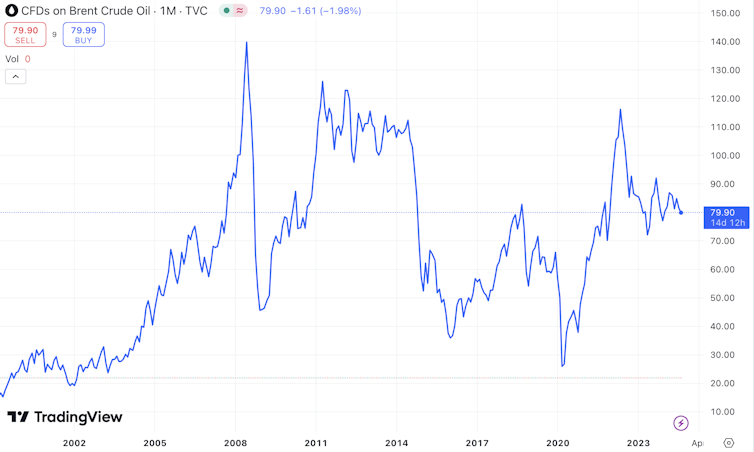Oil prices will whipsaw as we move to net zero, which could be disastrous for low-income producer countries
- Written by Adi Imsirovic, Fellow in Energy Economics, University of Surrey

One huge question for the future of the global economy is how oil will be affected by the transition to net zero. Any energy economist will tell you that predicting oil prices is something of a fool’s errand, given all the uncertainties involved – but it would be even more foolish not to think about them when they are so fundamental to everything we do.
First, a caveat. It hasn’t been the easiest few months in the battle to achieve net zero. Numerous multinational companies and governments have been rowing back[1] on their commitments, under pressure from shareholders and voters to avoid spending money to solve problems that can still seem far into the future.
From my perspective, this can be incredibly frustrating, since anyone who has studied the numbers understands that net zero is the only sensible way forward. Yes, the International Energy Agency reckons[2] that we need to invest an additional US$4.5 trillion (£3.5 trillion) a year in clean energy to meet the Paris climate goal[3] of restricting global warming to 1.5°C. But by my calculation[4], it will cost society about US$8.7 trillion a year in climate-related damage if we don’t spend that money.
When this is the reality, you have to assume common sense will still prevail. If so, one of the implications is we’re heading for a future in which most transport will be electric. Again, this is unarguably the best way forward.
The average well-to-wheel efficiency[5] of electric vehicles (EVs) is about 80%, which refers to the proportion of the energy released from the battery that actually turns the wheels. By the same measure, internal combustion vehicles are only 20% efficient. EVs are, in fact, cleaner even when[6] they are powered by electricity from fossil fuels.
If EVs are going to dominate transportation, that implies a huge change in the world fleet of vehicles in the years ahead. Notwithstanding their enormous growth, only 14%[7] of all new car sales are currently electric, while shipping[8] and especially aviation[9] are considerably further behind.
Brent crude oil price, 2000-24







